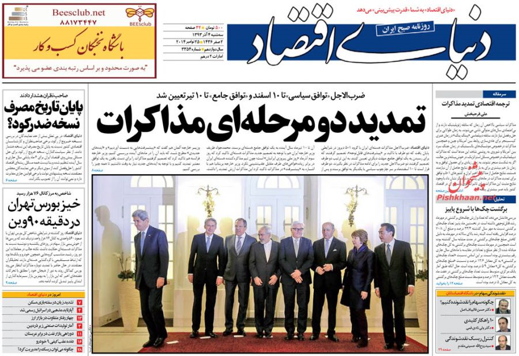On November 25, one day after the closing of nuclear talks between Iran and world powers, Donyay-e Eghtesad, a daily, carried a piece on what the extension of Vienna talks translates into, economically. The following is the translation of how the paper’s Ali Farahbakhsh assessed the outcome of the talks through an economic prism:
Political negotiations, in particular those with a geopolitical background which have dragged on for quite a few years thanks to distrust, require a long time to produce results.
A look at Ping-Pong Diplomacy pursued by Henry Kissinger, which was aimed at normalizing relations between America and China, as well as at the talks over ballistic missiles during the Cold War between the US and the Soviet Union clearly highlights the fact that in the most ideal of conditions, diplomatic negotiations over strategic issues either fail, or need quite a while to produce an agreement. Even more time is required to see such a deal come to fruition.
The outcome of the recent talks between Iran and P5+1 and the agreement over extension of the negotiations into the months ahead one more time showed that in spite of positive results coming out of the talks, we need to exercise more patience to witness a profound impact on the economy.
Although over the past few months, politicians and those active on the economic front have outlined the probable scenarios for the talks and sized up the likely impact of each on the economy, the important question is: “Now that the scenario of extension has been played out, based on what assumptions, should macroeconomic policies, by the government, and microeconomic policies, by economic institutions, be formulated?”
Although a nuclear deal could play an effective role in turning the economy around, policies at home seem to determine where the economy is heading for.
In fact, external factors resulting from diplomatic developments could have more effects on the pace of developments rather than giving directions to the economy.
As a matter of fact, the positive effects of the removal of sanctions should not be blown out of proportion, nor should it be assumed that all economic woes, several of which have cropped up on the back of dysfunctional structures, would be addressed overnight as soon as sanctions are lifted.
Actually, sanctions have exposed many of our internal flaws. When the previous government [Ahmadinejad’s] was in office, a lot of mismanagement was kept hidden behind sanctions without drawing a distinction between the ramifications of wrong macroeconomic policies and those of sanctions.
If our politicians are under the impression that the removal of sanctions will see an inflow of foreign currency which could act as a panacea for our economic problems, they are making a strategic miscalculation.
As it was mentioned, for one thing, there is no silver bullet for strategic disputes. For another, in the highly unlikely event of easy access to all foreign currency revenues of the country, history suggests that substantial amounts of petrodollars not only may fail to address the economic woes of the country, but they may give rise to a more deepening crisis.
For instance, the 1973 oil shock [which began in October when members of the Organization of Arab Petroleum Exporting Countries (OAPEC), consisting of the Arab members of the OPEC, plus Egypt, Syria and Tunisia, proclaimed an oil embargo which saw oil prices rise from $3 per barrel to nearly $12 by the end of the embargo in March 1974] which swelled the coffers of the previous regime did nothing to prevent the collapse of the Pahlavi Regime in 1979.
Nor did the petrodollars of the previous government – nearly $120 billion in annual revenues – lead to a pretty pass, and the baton was passed on to Rouhani in conditions that the country’s economic growth was languishing in negative territory while Iran’s economy was fighting a losing battle against an unprecedented recession which had spiraled out of control.
Which direction the economy at home takes is more influenced by our politicians rather than by uncontrollable external factors. Among other things, the mounting growth of liquidity, unbalanced interest rates, a big and dysfunctional state sector, an unsuited atmosphere for business, and implementation of privatization at a snail’s pace are key factors at play which can be streamlined by our politicians rather than by nuclear talks.
Above all, the process of economic policymaking in Iran reveals that the driving force behind the economy has usually gathered more momentum and turned out to be more functional in the face of uphill challenges. That has added more weight to implementation of economic reforms.
However, whenever Iran’s economy rakes in petrodollars, it simply invests its focus in how such additional revenues must be allocated, and it suddenly gets forgetful of transforming the economic structure of the country.
Although, to arrive at a multilateral deal, there is a bumpy road ahead, returning to the point where we were before the start of the talks is impossible.
Even if a minimum agreement is reached in the upcoming months, a new raft of sanctions is unlikely to be implemented. Besides, under the new accord in Vienna, in the next seven months, nearly $5 billion of Iran’s foreign currency revenues will return to government coffers.
The bottom line is that our policymakers should not attach the fate of the economy to the outcome of the negotiations. Rather, they should make efforts to put forth a coherent economic overhaul plan to lay the groundwork for economic growth. As an old saying goes, “Bad luck often brings good luck”, we can turn curses into blessings.
